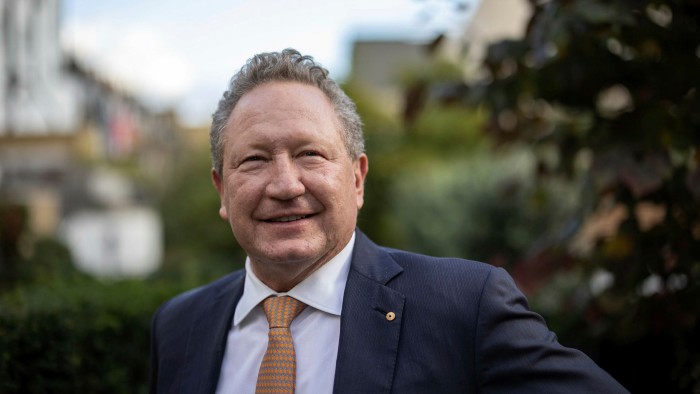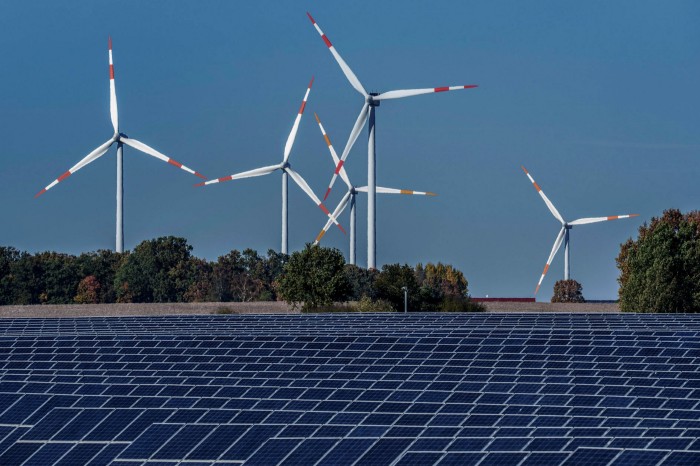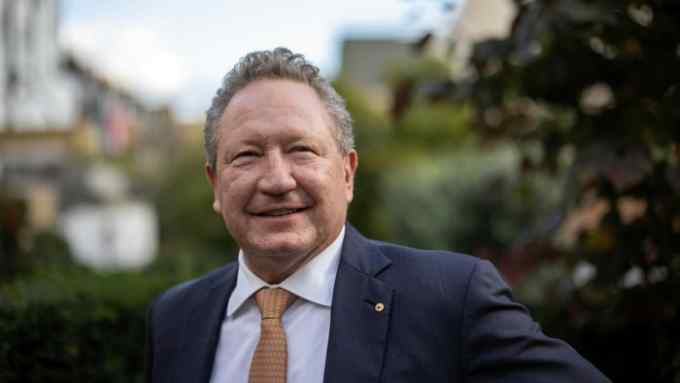Mining mogul Andrew Forrest doubles down on green hydrogen

Roula Khalaf, Editor of the FT, selects her favourite stories in this weekly newsletter.
No one can accuse Andrew Forrest of lacking ambition.
The billionaire businessman made a fortune by busting open the Western Australia iron ore duopoly of mining powerhouses BHP Group and Rio Tinto — something the sceptics said could not be done.
He now wants to make another fortune by helping to save the planet and transforming the mining company he controls — Fortescue Metals Group — into a global leader in renewable energy, and specifically green hydrogen.
During a recent visit to London for the FT Hydrogen Summit, the Australian discussed his plans for FMG, lashed out at companies promoting blue hydrogen, and questioned the green credentials of Tesla’s Elon Musk.
Forrest reckons his green energy unit, Fortescue Future Industries, can go from a standing start to producing 15mn tonnes a year of green hydrogen by 2030 — just 5mn tonnes less than the goal set by the European Commission in the same period.
He believes green hydrogen can be produced in places where there is access to cheap, renewable energy and then exported to the rest of the world in the form of ammonia or other hydrogen derivatives. His view is that it will become a globally traded commodity.
Not everyone shares his confidence. Turning sunlight into hydrogen, then ammonia, and eventually back into electricity, results in energy losses of more than 80 per cent, according to some academics. Even so, there are plenty of supporters who think it could be successful if it is bundled with carbon pricing.
To that end, FFI has already signed a long list of non-binding supply agreements, including deals with German utility company Eon and UK company JCB.
Analysts reckon Forrest will need to build around 200GW of wind and solar capacity to hit his 2030 target, at a cost that could run into hundreds of billions of dollars.

Asked how he planned to finance his plans, Forrest pointed to FMG’s annual results, noting that the company generated earnings before interest, tax and depreciation last year of $16bn, and $10bn of net profit after tax, on the back of rising prices for iron ore.
“Look, I built $50bn worth of iron ore infrastructure in the Pilbara,” he told the summit in London. “I am very used to executing large capital projects at a cost that is fraction of what our competitors do.”
Of his deal with Germany’s Eon, Forrest said: “They have asked for 5mn tonnes [of green hydrogen a year by 2030] and they are going to get it.”
To support the nascent green hydrogen industry, Forrest called on governments to provide the right policy support. He cited the US tax credit worth up to $3 per kilogramme for clean hydrogen, and German contracts-for-difference — a subsidy that guarantees a minimum price for producers — as good examples.
More stories from this report
He said blue hydrogen, which is produced from natural gas and uses carbon capture and storage technology to deal with the emissions, was a dangerous distraction that risked “crushing legitimate green companies and initiatives” by claiming to be low carbon.
Forrest said he had yet to meet a scientist who thought gas buried underground, through CCS technology, leaked at less than 1 per cent a year, warning that “it leaks a lot quicker than that”.
“That means the whole lot comes back out in the exact century you’re supposed to get rid of it,” he said. “That’s not carbon sequestration, that’s greenwashing.”
Responding to recent comments made by Tesla’s Elon Musk that hydrogen fuels cells, which can be used to power trucks and cars, are “mind bogglingly stupid”, Forrest said electric vehicles were not always as environmentally friendly as portrayed.
“He [Musk] knows that, almost every time a Tesla is plugged into almost every grid in the world, it is just burning coal and oil and gas,” he said. “I mean, it is doing nothing for the environment. So his ‘mind boggling stupid’ is whitewash.”
Asked about his recent decision to retake the reins at FMG as executive chair, Forrest said turning a “really successfully, globally respected mining” company green was two massive jobs.
“One, to keep that reputation and grow it; and the second, to make it fully green,” he said. “The job of FFI is scary . . . because you are dealing with new technology that is changing rapidly in front of your eyes. So, for the next two or three years, I just don’t want to leave it to chance. I want to be there to guide the company like I did in the early stages.”

Comments